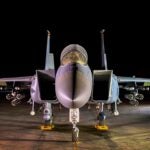
On June 24, U.S. Air Force Maj. Gen. John Newberry, the head of the Air Force Nuclear Weapons Center at Kirtland AFB, N.M., dismissed Air Force Col. Charles Clegg, the head of the Sentinel Systems Directorate at Hill AFB, Utah since the summer of 2022. "The Air Force Nuclear Weapons Center Commander removed the Sentinel Systems Director from his position on June 24th due to a loss of confidence in his ability to lead the directorate," the Air Force said…













